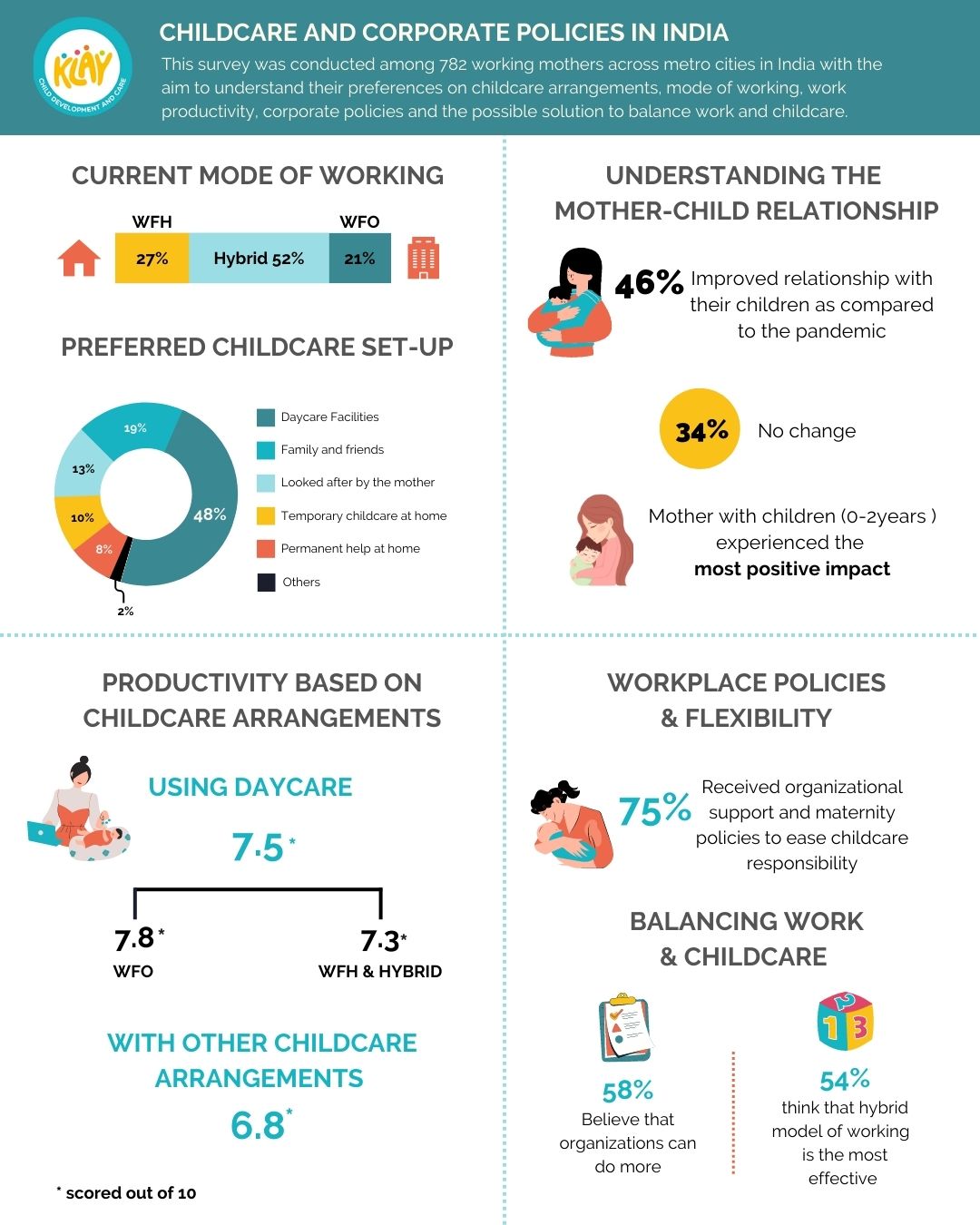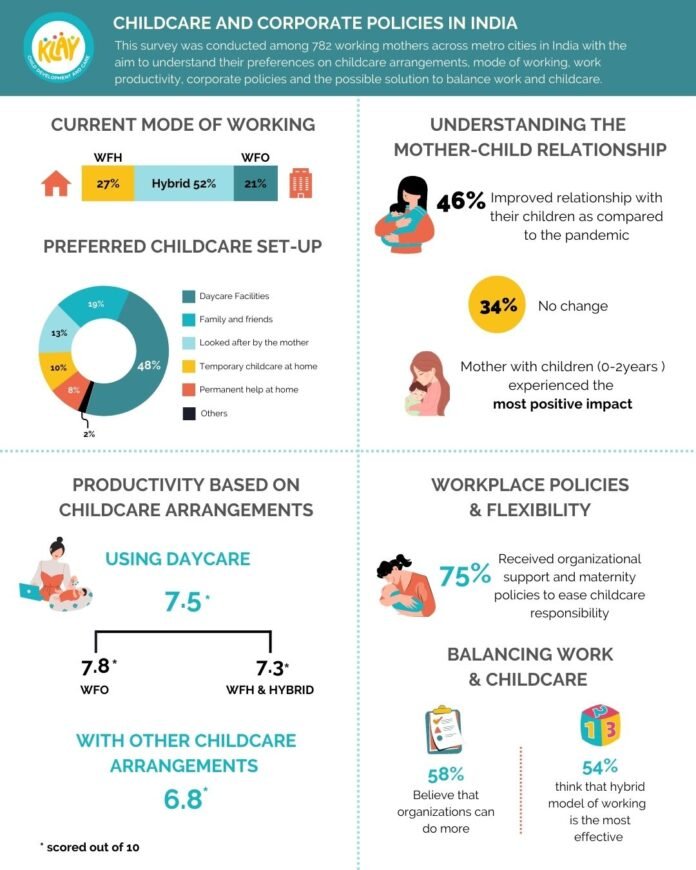Daycare centres have proven to be beneficial in boosting mother-child relationships with 48.16% of respondents reporting a positive change since the pandemic.
When compared to other childcare arrangements, mothers who use day care facilities as their primary childcare arrangement demonstrate upto 15% higher productivity levels, where women working from office have shown a score of 7.8 and women in a hybrid setup have shown a score of 7.3.
57.67% of working mothers believe that organisations can do more to help balance work and childcare
In March 2023, commonly marked as the month to celebrate women, KLAY Centres for Child Development and Care, a leader in early childhood care and education, conducted a survey titled ‘Childcare and Corporate Policies in India: An Analysis of Their Effect on Working Mothers and Their Productivity‘, among working mothers in India to understand the impact of their current childcare arrangements on their relationship with their children and their productivity at work. Furthermore, the survey sought to understand how their workplace policies supported them in managing the balance between work and childcare.
 |
Childcare and Corporate Policies in India – a survey by KLAY Child Development and Care
AK Srikanth, CEO, KLAY Centers for Child Development and Care, said, “Today, balancing work and caring for one’s child continues to be one of the biggest challenges faced by working mothers. This survey has reiterated our belief in the fact that the childcare infrastructure of a country wears many hats and serves the mother, the child, and the corporate! It has a huge role in alleviating maternal stress and guilt over leaving the child behind and going to work, it facilitates the child’s holistic development, helps organisations to provide meaningful support to their women employees and encourages greater workforce participation and retention. Further, childcare facilities can also impact the productivity of mothers while at work irrespective of whether she works from home or from the office“.
Key Insights from the survey
The mother-child relationship has improved post pandemic: While the pandemic played an important role in bringing families together, the survey found something unexpected. Mothers felt that their relationship with their children improved post pandemic, especially with clearly defined boundaries between work and family.
On being asked how the current work model, post pandemic, has impacted the mothers’ relationship with their children, 46.42% said that the relationship has improved, while 34.30% observed no change.
Mothers with children between the ages of 0-2 years, who are currently working in hybrid mode, report mostly a positive relationship now as compared to during the pandemic.
Interestingly, Daycares have proved to be beneficial in boosting mother-child relationships with 48.16% of respondents reporting a positive change compared to the pandemic.
The research further revealed that Daycare arrangements emerged as a leading contributing factor for enhanced job productivity in both WFO and WFH paradigms
Of the different arrangements that mothers have to ensure that their children are cared for while at work, 48.59% of the respondents said that they lean on daycare facilities, 18.41% said that they seek help from family and friends, and 12.53% stated that they looked after their children themselves.
Daycare facilities emerged as the most common arrangement for children aged between 2-3 years (52.74%), followed by children aged between 4-5 years (49.75%), and for less than 2 years (47.97%).
It has been observed that when compared to other modes of childcare arrangements, mothers who use day care facilities as their primary childcare arrangement show upto 15% higher productivity regardless of the mode of working.
Among women working from office, those utilising daycare facilities have seen a higher productivity score of 7.8 on 10 as compared to 7.4 on 10, as seen by their counterparts who use other childcare arrangements.
Among women working in the hybrid setup, those utilising daycare facilities have seen a higher productivity score of 7.3 on 10 as compared to 6.7 on 10, as seen by their counterparts who use other childcare arrangements.
In fact, the most significant impact on productivity was seen in mothers working from home who used a daycare facility than those who used other childcare arrangements, with productivity scores jumping from 6.3 to 7.3.
Support from the workplace exists, but the gap remains
Over 75% of working mothers surveyed acknowledged that companies have provided maternity policies and leaves to ease their childcare burden. The support comes in different forms such as corporate tie-ups with childcare providers, flexible working hours, a more supportive environment with respect to peers and leadership, etc.
**Majority of the respondents that have said the above belong to the BFSI and IT industry.
However, nearly 60% of working mothers said that organisations can do more to help balance work and childcare, such as providing childcare facilities for women working in shifts, granting leaves or enabling a hybrid mode of working when there is a childcare emergency as well as arranging transport facilities for both the mother and the child.
Furthermore, mothers between the ages of 25-29 (63.64%) and 30-34 (60.00%) believed that the childcare support garnered from their organisation could be better when compared with other age group cohorts
The ‘Childcare and Corporate Policies in India: An Analysis of Their Effect on Working Mothers and Their Productivity’ report was administered through Survey Monkey and clocked responses from 780 participants between the ages of 25 and 40. The findings were generated based on the consideration of the unfiltered sample dataset, as well as through filtering the data across different parameters such as age bracket, occupation, industry, gender, etc.
Click here to read the full report.
About KLAY Centres for Child Development and Care
KLAY Centers for Child Development and Care is India’s largest non-franchised chain of child development and care centres, recognized for world-class child care and development enabled by a passionate set of early years’ facilitators and caregivers. The KLAY community encompasses 50,000+ parents across India, spanning 150+ retail centres spread across Bengaluru, Gurgaon, Noida, Pune, Mumbai, Hyderabad and Chennai. As a childcare provider for more than 400+ organisations, we help them build family friendly workplaces and help children achieve their developmental milestones.



